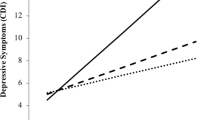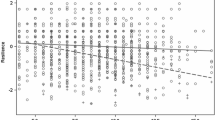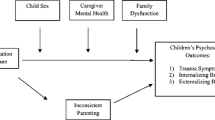Abstract
Extremely low birth weight (ELBW; <1000 g) survivors are at increased risk for experiencing both peer victimization and overprotective parenting. This study investigated if overprotective parenting moderated associations between peer victimization and psychopathology among ELBW adult survivors who have been followed since birth. Participants included 81 (31 male, 50 female) adults born with an extremely low birth weight from Ontario, Canada. The participants were predominately Caucasian. The experience of peer victimization and overprotective parenting prior to age 16 was self-reported at age 22–26 years. Peer victimization was reported using the Childhood Experiences of Violence Questionnaire and overprotective parenting was reported using the Parental Bonding Instrument. Current anxiety disorder and alcohol or substance use disorder was assessed using the MINI International Neuropsychiatric Interview at age 29–36 years. The experience of overprotective parenting moderated the association between peer victimization and risk for an anxiety disorder in adulthood (OR 2.35, 95% CI, 1.01–5.50). If the ELBW survivor reported having an overprotective parent, peer victimization was associated with increased risk for having an anxiety disorder in adulthood (OR 2.45, 95% CI, 1.13–5.30). In contrast, this association was not significant in the absence of an overprotective parent (OR 1.04, 95% CI, 0.73–1.49). Future research should further investigate if parental support and encouragement of children’s independence may be important for reducing the negative effects of peer victimization among ELBW survivors.



Similar content being viewed by others
References
Achenbach, T. M. (1991). Integrative guide for the 1991 CBCL/4-18, YSR, and TRF profiles. Burlington, VT: University of Vermont, Department of Psychiatry.
Aiken, L. S., & West, S. G. (1991). Multiple regression: Testing and interpreting interactions. Newbury Park, London: Sage.
Bernardi, E., Jones, M., & Tennant, C. (1989). Quality of parenting in alcoholics and narcotic addicts. The British Journal of Psychiatry, 154, 677–682. https://doi.org/10.1192/bjp.154.5.677.
Boyle, M. H., Miskovic, V., Van Lieshout, R., Duncan, L., Schmidt, L. A., & Hoult, L., et al. (2011). Psychopathology in young adults born at extremely low birth weight. Psychological Medicine, 41, 1763–1774. https://doi.org/10.1017/S0033291710002357.
Byles, J., Byrne, C., Boyle, M. H., & Offord, D. R. (1988). Ontario Child Health Study: Reliability and validity of the general functioning subscale of the McMaster Family Assessment Device. Family Process, 27, 97–104. https://doi.org/10.1111/j.1545-5300.1988.00097.x.
Chevret, S., Seaman, S., & Resche-Rigon, M. (2015). Multiple imputation: A mature approach to dealing with missing data. Intensive Care Medicine, 41, 348–350. https://doi.org/10.1007/s00134-014-3624-x.
Cooke, R. W. I. (2004). Health, lifestyle, and quality of life for young adults born very preterm. Archives of Disease in Childhood, 89, 201–206. https://doi.org/10.1136/adc.2003.030197.
Copeland, W. E., Wolke, D., Angold, A., & Costello, E. J. (2013). Adult psychiatric outcomes of bullying and being bullied by peers in childhood and adolescence. JAMA Psychiatry, 70, 419–426. https://doi.org/10.1001/jamapsychiatry.2013.504.
Dawson, J. F. (2014). Moderation in management research: What, why, when and how. Journal of Business and Psychology, 29, 1–19. https://doi.org/10.1007/s10869-013-9308-7.
Day, K. L., Schmidt, L. A., Vaillancourt, T., Saigal, S., Boyle, M. H., & Van Lieshout, R. J. (2016). Long-term psychiatric impact of peer victimization in adults born at extremely low birth weight. Pediatrics, 137, 1–8. https://doi.org/10.1542/peds.2015-3383.
Day, K. L., Van Lieshout, R. J., Vaillancourt, T., & Schmidt, L. A. (2015). Peer victimization in survivors of premature birth and low birth weight: Review and recommendations. Aggression and Violent Behavior, 25, 259–265. https://doi.org/10.1016/j.avb.2015.09.010.
Due, P., Holstein, B. E., Lynch, J., Diderichsen, F., Gabhain, S. N., Scheidt, P., & Currie, C. (2005). Bullying and symptoms among school-aged children: International comparative cross sectional study in 28 countries. The European Journal of Public Health, 15, 128–132. https://doi.org/10.1093/eurpub/cki105.
Edwards, S. L., Rapee, R. M., & Kennedy, S. (2010). Prediction of anxiety symptoms in preschool‐aged children: examination of maternal and paternal perspectives. Journal of Child Psychology and Psychiatry, 51, 313–321. https://doi.org/10.1111/j.1469-7610.2009.02160.x.
Emmelkamp, P. M., & Heeres, H. (1988). Drug addiction and parental rearing style: A controlled study. International Journal of the Addictions, 23, 207–216. https://doi.org/10.3109/10826088809085116.
Epstein, N. B., Baldwin, L. M., & Bishop, D. S. (1983). The McMaster family assessment device. Journal of Marital and Family Therapy, 9, 171–180. https://doi.org/10.1111/j.1752-0606.1983.tb01497.x.
Feldman, R. (2007). Maternal versus child risk and the development of parent–child and family relationships in five high-risk populations. Development and Psychopathology, 19, 293–312. https://doi.org/10.1017/S0954579407070150.
Forcada-Guex, M., Pierrehumbert, B., Borghini, A., Moessinger, A., & Muller-Nix, C. (2006). Early dyadic patterns of mother–infant interactions and outcomes of prematurity at 18 months. Pediatrics, 118, e107–e114. https://doi.org/10.1542/peds.2005-1145.
Hack, M., Flannery, D. J., Schluchter, M., Cartar, L., Borawski, E., & Klein, N. (2002). Outcomes in young adulthood for very-low-birth-weight infants. New England Journal of Medicine, 346, 149–157. https://doi.org/10.1056/NEJMoa010856.
Hack, M., Youngstrom, E. A., Cartar, L., Schluchter, M., Taylor, H. G., & Flannery, D., et al. (2004). Behavioral outcomes and evidence of psychopathology among very low birth weight infants at age 20 years. Pediatrics, 114, 932–940. https://doi.org/10.1542/peds.2003-1017-L.
Hollingshead, A. B. (1969). Two-factor index of social position (mimeograph). New Haven, CT: Yale University Press.
Hudson, J. L., Rapee, R. M. (2001). Parent–child interactions and anxiety disorders: An observational study. Behaviour Research and Therapy, 39, 1411–1427. https://doi.org/10.1016/S0005-7967(00)00107-8.
Indredavik, M. S., Vik, T., Heyerdahl, S., Romundstad, P., & Brubakk, A. M. (2005). Low‐birthweight adolescents: Quality of life and parent–child relations. Acta Paediatrica, 94, 1295–1302. https://doi.org/10.1111/j.1651-2227.2005.tb02091.x.
Jaekel, J. (2016). Commentary: Supporting preterm children’s parents matters–a reflection on Treyvaud et al. (2016). Journal of Child Psychology and Psychiatry, 57, 822–823. https://doi.org/10.1111/jcpp.12525.
Jaekel, J., Wolke, D., & Chernova, J. (2012). Mother and child behaviour in very preterm and term dyads at 6 and 8 years. Developmental Medicine & Child Neurology, 54, 716–723. https://doi.org/10.1111/j.1469-8749.2012.04323.x.
Lindström, K., Lindblad, F., & Hjern, A. (2009). Psychiatric morbidity in adolescents and young adults born preterm: A Swedish national cohort study. Pediatrics, 123, e47–e53. https://doi.org/10.1542/peds.2008-1654.
Lund, L. K., Vik, T., Skranes, J., Brubakk, A. M., & Indredavik, M. S. (2011). Psychiatric morbidity in two low birth weight groups assessed by diagnostic interview in young adulthood. Acta Paediatrica, 100, 598–604. https://doi.org/10.1111/j.1651-2227.2010.02111.x.
Marschall-Lévesque, S., Castellanos-Ryan, N., Parent, S., Renaud, J., Vitaro, F., & Boivin, M., et al. (2017). Victimization, suicidal ideation, and alcohol use from age 13 to 15 years: Support for the self-medication model. Journal of Adolescent Health, 60, 380–387. https://doi.org/10.1016/j.jadohealth.2016.09.019.
Mathewson, K. J., Chow, C. H., Dobson, K. G., Pope, E. I., Schmidt, L. A., & Van Lieshout, R. J. (2017). Mental health of extremely low birth weight survivors: A systematic review and meta-analysis. Psychological Bulletin, 143, 347–383. https://doi.org/10.1037/bul0000091.
McDougall, P., & Vaillancourt, T. (2015). Long-term adult outcomes of peer victimization in childhood and adolescence: Pathways to adjustment and maladjustment. American Psychologist, 70, 300–310. https://doi.org/10.1037/a0039174.
Olweus, D. (1993). Victimization by peers: Antecedents and long-term outcomes. In K. H. Rubin & J. B. Asendorpf (Eds.), Social withdrawal, inhibition, and shyness in childhood (pp. 315–341). Hillsdale, NJ: Lawrence Erlbaum Associates.
Olweus, D. (1999). Sweden. In P. K. Smith, Y. Morita, J. Junger-Tas, D. Olweus, R. Catalano & P. Slee (Eds.), The nature of school bullying: A cross-national perspective (pp. 7–27). New York, NY: Routledge.
Parker, G. (1988). The parental bonding instrument: Psychometric properties reviewed. Psychiatric Developments, 7, 317–335.
Pettit, G. S., Bates, J. E., & Dodge, K. A. (1997). Supportive parenting, ecological context, and children’s adjustment: A seven-year longitudinal study. Child Development, 68, 908–923. https://doi.org/10.1111/j.1467-8624.1997.tb01970.x.
Pyhälä, R., Räikkönen, K., Pesonen, A. K., Heinonen, K., Lahti, J., & Hovi, P., et al. (2011). Parental bonding after preterm birth: Child and parent perspectives in the Helsinki study of very low birth weight adults. Journal of Pediatrics, 158, 251–256. https://doi.org/10.1016/j.jpeds.2010.07.059.
Raby, K. L., Roisman, G. I., Fraley, R. C., & Simpson, J. A. (2015). The enduring predictive significance of early maternal sensitivity: Social and academic competence through age 32 years. Child Development, 86, 695–708. https://doi.org/10.1111/cdev.12325.
Reijntjes, A., Kamphuis, J. H., Prinzie, P., & Telch, M. J. (2010). Peer victimization and internalizing problems in children: A meta-analysis of longitudinal studies. Child Abuse & Neglect, 34, 244–252. https://doi.org/10.1016/j.chiabu.2009.07.009.
Rivers, I. (2001). Retrospective reports of school bullying: Stability of recall and its implications for research. British Journal of Developmental Psychology, 19, 129–141. https://doi.org/10.1348/026151001166001.
Saigal, S., Day, K. L., Van Lieshout, R. J., Schmidt, L. A., Morrison, K. M., & Boyle, M. H. (2016). Health, wealth, social integration, and sexuality of extremely low-birth-weight prematurely born adults in the fourth decade of life. JAMA Pediatrics, 170, 678–686. https://doi.org/10.1001/jamapediatrics.2016.0289.
Saigal, S., Rosenbaum, P., Stoskopf, B., Sinclair, J. C. (1984). Outcome in infants 501 to 1000 gm birth weight delivered to residents of the McMaster Health Region. Journal of Pediatrics, 105, 969–976. https://doi.org/10.1016/S0022-3476(84)80093-1.
Saigal, S., Szatmari, P., Rosenbaum, P., Campbell, D., King, S. (1991). Cognitive abilities and school performance of extremely low birth weight children and matched term control children at age 8 years: a regional study. Journal of Pediatrics, 118, 751–760. https://doi.org/10.1016/S0022-3476(05)80043-5.
Schmidt, L. A., Miskovic, V., Boyle, M. H., & Saigal, S. (2008). Shyness and timidity in young adults who were born at extremely low birth weight. Pediatrics, 122, e181–e187. https://doi.org/10.1542/peds.2007-3747.
Schreier, A., Wolke, D., Thomas, K., Horwood, J., Hollis, C., & Gunnell, D., et al. (2009). Prospective study of peer victimization in childhood and psychotic symptoms in a nonclinical population at age 12 years. Archives of General Psychiatry, 66, 527–536. https://doi.org/10.1001/archgenpsychiatry.2009.23.
Schwartz, D., Lansford, J. E., Dodge, K. A., Pettit, G. S., & Bates, J. E. (2015). Peer victimization during middle childhood as a lead indicator of internalizing problems and diagnostic outcomes in late adolescence. Journal of Clinical Child & Adolescent Psychology, 44, 393–404. https://doi.org/10.1080/15374416.2014.881293.
Sheehan, D. V., Lecrubier, Y., Sheehan, K. H., Amorim, P., Janavs, J., & Weiller, E., et al. (1998). The Mini-International Neuropsychiatric Interview (MINI): The development and validation of a structured diagnostic psychiatric interview for DSM-IV and ICD-10. Journal of Clinical Psychiatry, 59(Suppl 20), 22–33.
Sheehan, D. V., Lecrubier, Y., Sheehan, K. H., Janavs, J., Weiller, E. et al. (1997). The validity of the Mini International Neuropsychiatric Interview (MINI) according to the SCID-P and its reliability. European Psychiatry, 12, 232–241. https://doi.org/10.1016/S0924-9338(97)83297-X.
Spokas, M., & Heimberg, R. G. (2009). Overprotective parenting, social anxiety, and external locus of control: Cross-sectional and longitudinal relationships. Cognitive Therapy and Research, 33, 543–551. https://doi.org/10.1007/s10608-008-9227-5.
Tharp-Taylor, S., Haviland, A., & D’Amico, E. J. (2009). Victimization from mental and physical bullying and substance use in early adolescence. Addictive Behaviors, 34, 561–567. https://doi.org/10.1016/j.addbeh.2009.03.012.
Ttofi, M. M., Farrington, D. P., Lösel, F., & Loeber, R. (2011). Do the victims of school bullies tend to become depressed later in life? A systematic review and meta-analysis of longitudinal studies. Journal of Aggression, Conflict and Peace Research, 3, 63–73. https://doi.org/10.1108/17596591111132873.
Van Lieshout, R. J., Boyle, M. H., Saigal, S., Morrison, K., & Schmidt, L. A. (2015). Mental health of extremely low birth weight survivors in their 30s. Pediatrics, 135, 452–459. https://doi.org/10.1542/peds.2014-3143.
Vieno, A., Gini, G., & Santinello, M. (2011). Different forms of bullying and their association to smoking and drinking behavior in Italian adolescents. Journal of School Health, 81, 393–399. https://doi.org/10.1111/j.1746-1561.2011.00607.x.
Visser, L., de Winter, A. F., Vollebergh, W. A., Verhulst, F. C., & Reijneveld, S. A. (2012). The impact of parenting styles on adolescent alcohol use: the TRAILS study. European Addiction Research, 19, 165–172. https://doi.org/10.1159/000342558.
Walsh, C. A., MacMillan, H. L., Trocmé, N., Jamieson, E., & Boyle, M. H. (2008). Measurement of victimization in adolescence: Development and validation of the Childhood Experiences of Violence Questionnaire. Child Abuse & Neglect, 32, 1037–1057. https://doi.org/10.1016/j.chiabu.2008.05.003.
Waxman, J., Van Lieshout, R. J., Saigal, S., Boyle, M. H., & Schmidt, L. A. (2013). Still cautious: personality characteristics of extremely low birth weight adults in their early 30s. Personality and Individual Differences, 55, 967–971. https://doi.org/10.1016/j.paid.2013.08.003.
Wightman, A., Schluchter, M., Drotar, D., Andreias, L., Taylor, H. G., & Klein, N., et al. (2007). Parental protection of extremely low birth weight children at age 8 years. Journal of Developmental & Behavioral Pediatrics, 28, 317–326. https://doi.org/10.1097/DBP.0b013e3180330915.
Wilhelm, K., & Parker, G. (1990). Reliability of the parental bonding instrument and intimate bond measure scales. Australian and New Zealand Journal of Psychiatry, 24, 199–202. https://doi.org/10.3109/00048679009077683.
Wolke, D., Copeland, W. E., Angold, A., & Costello, E. J. (2013). Impact of bullying in childhood on adult health, wealth, crime, and social outcomes. Psychological Science, 24, 1958–1970. https://doi.org/10.1177/0956797613481608.
Wood, J. J., McLeod, B. D., Sigman, M., Hwang, W. C., & Chu, B. C. (2003). Parenting and childhood anxiety: Theory, empirical findings, and future directions. Journal of Child Psychology and Psychiatry, 44, 134–151. https://doi.org/10.1111/1469-7610.00106.
Acknowledgements
Dr. Kimberly L. Day is now in the Department of Psychology at the University of West Florida. We thank the many participants and their families for their continued participation. We are also grateful to the following research staff from McMaster University: Nicole Folland, PhD, Paz Fortier, BA, Karen Mathewson, PhD, Sue McKee, BA, Barbara Stoskopf, RN, MHSc, Jordana Waxman, MSc, and Shirien Yunus, BSc, for their help with data collection and organizing the assessments.
Author Contributions
K. L. D. analyzed the data and wrote the manuscript. L. A. S. designed and executed the study and collaborated with the writing and editing of the final manuscript and provided funding. T. V. collaborated with the writing and editing of the final manuscript. S. S. collaborated with the design and execution of the study and collaborated with the writing and editing of the final manuscript. M. H. B. collaborated with the writing and editing of the final manuscript. R. J. V. designed and executed of the study and collaborated with the writing of the final manuscript.
Funding
This research was funded by Canadian Institutes of Health Research Grants CIHR: TMH-103145 (to Dr. Louis A. Schmidt) and CIHR: MOP42536 (to Dr. Saroj Saigal), National Institute of Child Health and Human Development Grant NICHD: 1-R01HD40219 (to Dr. Saroj Saigal), and a Lawson Post-Doctoral Fellowship (to Dr. Kimberly L. Day).
Author information
Authors and Affiliations
Corresponding author
Ethics declarations
Conflict of Interest
The authors declare that they have no competing interests.
Ethical Approval
All procedures performed in studies involving human participants were in accordance with the ethical standards of McMaster University’s and Hamilton Health Sciences’ ethics committees and with the 1964 Helsinki declaration and its later amendments or comparable ethical standards.
Rights and permissions
About this article
Cite this article
Day, K.L., Schmidt, L.A., Vaillancourt, T. et al. Overprotective Parenting and Peer Victimization in Extremely Low Birth Weight Survivors. J Child Fam Stud 27, 907–915 (2018). https://doi.org/10.1007/s10826-017-0922-2
Published:
Issue Date:
DOI: https://doi.org/10.1007/s10826-017-0922-2




